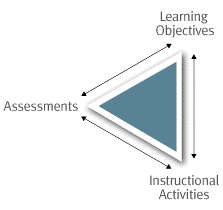Course assessments are designed to measure if and to what extent students are mastering the program and course learning objectives. For this to occur, assessments, learning objectives, and instructional strategies need to closely align.
Tips
- Be sure the intended learning objectives (program-level and course-level) are defined before the assessments and course activities are designed
- Use measurable action verbs in learning objectives that describe what students need to do to demonstrate their learning.
- Consider the verb used in the learning objective when developing the assessment. The verb in the learning objective is the clue as to what kinds of assessments will provide insight into whether students have met the objective. What tasks or activities does it say the students will be able to do with the knowledge they gained, skills they have developed, or mindsets/attitudes they have developed?
- Create a table showing how each objective is measured.
Examples based on Bloom’s taxonomy
| Sample learning objective verbs | Examples of aligned assessments |
| Recall, recognize, identify | Fill-in-the blank, matching, labeling, multiple-choice questions |
| Interpret, summarize, infer, compare, explain | Papers, problem sets, class discussions, concept mapping, summarize readings, compare and contrast theories/event, paraphrase documents, find examples of a concept/principle |
| Apply, execute, implement | Performances, labs, prototyping, simulations; determine which procedures are most appropriate for a given task |
| Analyze | Case studies, critiques, labs, papers, projects, debates |
| Evaluate, critique, assess | Journals, critiques, reviews, or activities that require students to test or judge against established standards |
| Create, generate, produce, design | Research projects, musical composition, performance, essays, business plans, website design, or a design activity that has students make, build or generate something new |
Resources
Fink, L. D. (2013). Creating significant learning experiences, revised and updated: an integrated approach to designing college courses. San Francisco: Jossey-Bass.
Wiggins, G. P., & McTighe, J. (2008). Understanding by design. Alexandria, VA: Association for Supervision and Curriculum Development.
Quick Links
![]()
Consult with our CETL Professionals
Consultation services are available to all UConn faculty at all campuses at no charge.